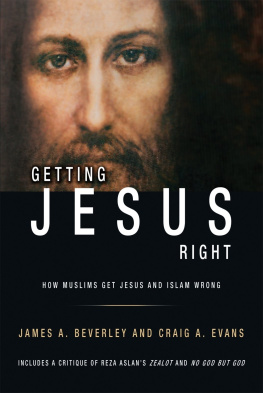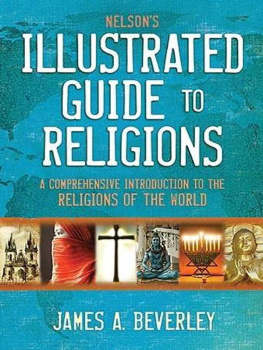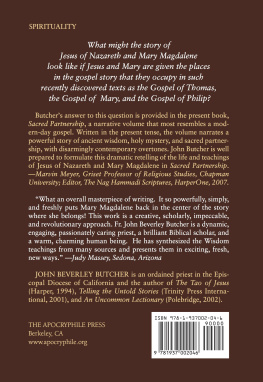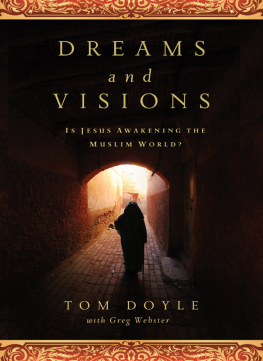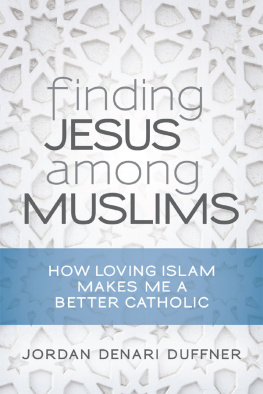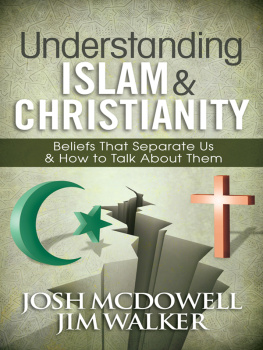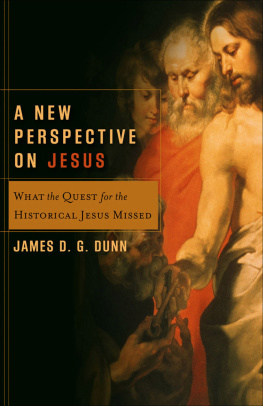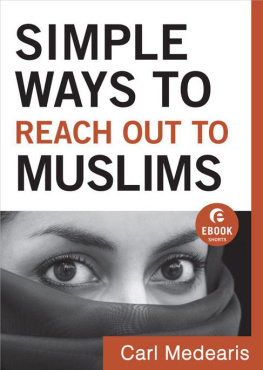James A. Beverley - Getting Jesus Right: How Muslims Get Jesus and Islam Wrong
Here you can read online James A. Beverley - Getting Jesus Right: How Muslims Get Jesus and Islam Wrong full text of the book (entire story) in english for free. Download pdf and epub, get meaning, cover and reviews about this ebook. year: 2015, publisher: Castle Quay Books, genre: Religion. Description of the work, (preface) as well as reviews are available. Best literature library LitArk.com created for fans of good reading and offers a wide selection of genres:
Romance novel
Science fiction
Adventure
Detective
Science
History
Home and family
Prose
Art
Politics
Computer
Non-fiction
Religion
Business
Children
Humor
Choose a favorite category and find really read worthwhile books. Enjoy immersion in the world of imagination, feel the emotions of the characters or learn something new for yourself, make an fascinating discovery.
- Book:Getting Jesus Right: How Muslims Get Jesus and Islam Wrong
- Author:
- Publisher:Castle Quay Books
- Genre:
- Year:2015
- Rating:3 / 5
- Favourites:Add to favourites
- Your mark:
- 60
- 1
- 2
- 3
- 4
- 5
Getting Jesus Right: How Muslims Get Jesus and Islam Wrong: summary, description and annotation
We offer to read an annotation, description, summary or preface (depends on what the author of the book "Getting Jesus Right: How Muslims Get Jesus and Islam Wrong" wrote himself). If you haven't found the necessary information about the book — write in the comments, we will try to find it.
Getting Jesus Right: How Muslims Get Jesus and Islam Wrong — read online for free the complete book (whole text) full work
Below is the text of the book, divided by pages. System saving the place of the last page read, allows you to conveniently read the book "Getting Jesus Right: How Muslims Get Jesus and Islam Wrong" online for free, without having to search again every time where you left off. Put a bookmark, and you can go to the page where you finished reading at any time.
Font size:
Interval:
Bookmark:
Praise for Getting Jesus Right
The authors deal with every topic, from ancient manuscripts to terrorism, from Jesus to Muhammad, from the Crusades to colonialism, with accuracy, originality and courage. Getting Jesus Right is a provocative and powerful work.
David Cook
Associate professor of Religion, Rice University, and author of Understanding Jihad
Reza Aslan has won renown for telling the mainstream media what it wants to hear, while his media sycophants never challenge his statements, no matter how wildly false and inaccurate they are. But now he has definitively been exposed. This book is a scholarly and devastating critique of Aslans views on Jesus and Islam.
Robert Spencer
New York Times bestselling author of The Politically Incorrect Guide to Islam (and the Crusades) and The Truth About Muhammad
Essential reading for anybody who wishes to understand and respond to the Islamic argument about Jesus and Christianity. We are far too quiet and ill-informed; it is time to be equipped and to be able to proclaim truth to all and not just some people. A vital book.
Michael Coren
Columnist, author, public speaker, and radio and television talk show host
As a former Muslim, I know how easy it is to get Jesus wrong, which is why Getting Jesus Right is so important. Scholarly yet readable, Evans and Beverley respectfully challenge us to take an unflinching look at history. And they especially shine when bringing the real Jesus of history into focus. For Christians and non-Christians alike, I enthusiastically recommend Getting Jesus Right .
Abdu Murray
Author of Grand Central QuestionAnswering the Critical Concerns of the Major Worldviews
The squaring of faith with historical research is at least as much of a challenge for Muslims as it has long been for Christians; James Beverley and Craig Evans, in this learned and wide-ranging book, demonstrate exactly why.
Tom Holland
Author of In the Shadow of the Sword
Chapter 6How Do Muslims View Muhammad?
All views of Muhammad, including those of Reza Aslan, must be framed in the context of the traditional Islamic understanding of the prophet. What follows is the standard outline of Muhammads life from the perspective of Islamic orthodoxy. After looking at the traditional biography, we will examine Aslans interpretation of the prophet and then assess the credibility of both the traditional view and Aslans perspective. The standard Islamic view is derived from the Quran, early biographies of the prophet (sira), oral reports about him (hadith), military histories (maghazi) and early commentaries by Muslims (tafsir).
Most Muslims believe that Muhammad was born about AD 570 in the so-called year of the elephant. Muhammads father (Abdullah) died before he was born, and his mother (Amina) died shortly after his birth. She claimed that when she was pregnant she saw a light come forth from her by which she could see the castles of Busra in Syria. According to traditional commentaries on the Quran, the death of his parents is the context for the question in surah 93:6: Did He not find thee an orphan and give thee shelter (and care)? In his early years, Muhammad was cared for by his grandfather and then by an uncle (Abu Talib), who was his guardian until Muhammad reached his teen years.
The standard Muslim histories of the prophet mention that he went twice to Syria on trading missions with his uncle. These reports provided an apologetic motif not only for evidence of Muhammads acumen in business but for early witness to his future greatness. It is said that Muhammads prophetic status was foretold by Christian monks, on the first trip by Bahira (in some accounts an unnamed head of the convent gives the prophecy) and on the second journey by a monk named Nastur. The account of Bahira mentions a special physical mark on Muhammads body (between his shoulders), and the monk tells Alu Talib, Take your nephew back to his country and guard him carefully against the Jews, for by Allah if they see him and know about him what I know, they will do him evil; a great future lies before this nephew of yours, so take him home quickly.
Muhammad was married in about 595 to a woman merchant named Khadijah. The Muslim histories state she was either 28 or 40 at the time and had been married twice before. It is claimed that she married Muhammad after he had completed successful trade for her in Syria. Muslim sources also state that Khadijahs slave Maysara, who joined Muhammad on the trip to Syria, saw two angels protecting Muhammad. After Khadijah married Muhammad, they had four daughters and some sons, but the boys died early. Khadijah is famous for her affirmation of Muhammads prophetic status, assuring him that he was not being influenced by demonic spirits.
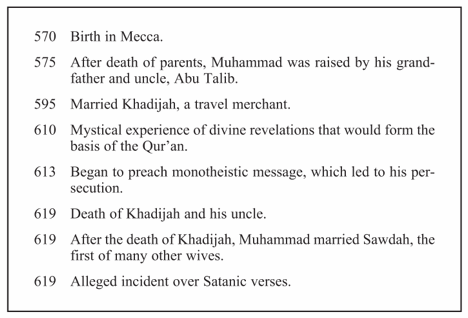
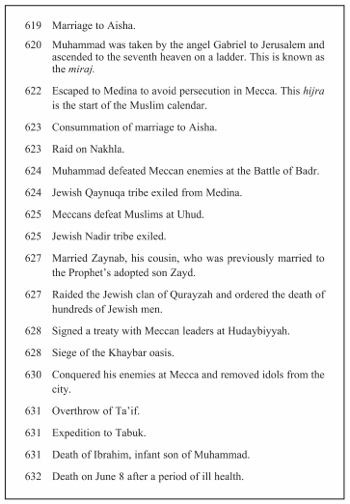
Muslims believe that Allahs call to Muhammad occurred on the 17th night of the Arabic month Ramadan in AD 610. According to both the sira and the traditional commentaries on the Quran, the archangel Gabriel (Djibril) is said to have visited him on Mount Hira, near Mecca. Surah 2:97 says of Gabriel that he brings down the (revelation) to thy heart by Allahs will. Surah 96 is viewed by most Muslims as the first revelation from Allah, while other Muslims argue that surah 74 forms the earliest message from God.
It is customary for Muslims to argue that Muhammad was illiterate ( ummi ), a position used to advance the divine inspiration of the Quran. This is also a convenient way to rebut charges that Muhammad copied ideas from Jewish and Christian Scriptures. Most Muslims use surah 29:48 to support the notion that the prophet was illiterate. And thou wast not (able) to recite a Book before this (Book came), nor art thou (able) to transcribe it with thy right hand: In that case, indeed, would the talkers of vanities have doubted. A minority of Muslims note that surah 25:46 mentions that the prophets opponents said that Muhammad had written down stories.
There has been much speculation about the episode of the satanic verses, which formed the basis for the title of Salman Rushdies controversial novel. The episode is reported in some early Muslim writings but is a rather disputed tradition (though one accepted by Watt and Guillaume, two famous Western scholars) that Muhammad at one time included a positive reference in surah 53 to the worship of three pagan goddesses (al-Lat, al-Uzza, and Manat). Gabriel is said to have excised the false teaching about these deities in a later revelation to the prophet. The story is used by critics of Islam as proof that the Quran was not always an infallible text.
Most traditional biographers claim that there was a pause ( fatra ) of three years before Muhammad began to preach to his fellow Meccans in AD 613. His message was largely ignored, though there were some converts (notably Abu Bakr). Muhammads early focus on social reform appealed most to the poorer clans. His preaching allowed focus on the Kaba and accommodated certain pagan elements in pre-Islamic pilgrimage rituals. Surah 2:158 gives permission for Muslims to trace a spiritual route between Safa and Marwa, two hills that once had stone idols on them. Muslims to this day follow the same pilgrimage during the Hajj.
As Muhammad turned his prophetic voice against idolatry and polytheism, he incurred the anger and insult of powerful tribal leaders. One of his uncles also resisted Muhammad, earning the uncle and his wife eternal damnation, according to the tafsir (commentary) on surah 111. The persecution of the prophet led him to try to gain support in Taif, 60 miles southeast of Mecca. The journey failed. Both there and in Mecca, support for polytheism had to do with vested commercial interests in supporting traditional Arab religious views and customs. It is no wonder that various surahs attempt to allay fears of financial loss for those who follow the path of Allah.
Next pageFont size:
Interval:
Bookmark:
Similar books «Getting Jesus Right: How Muslims Get Jesus and Islam Wrong»
Look at similar books to Getting Jesus Right: How Muslims Get Jesus and Islam Wrong. We have selected literature similar in name and meaning in the hope of providing readers with more options to find new, interesting, not yet read works.
Discussion, reviews of the book Getting Jesus Right: How Muslims Get Jesus and Islam Wrong and just readers' own opinions. Leave your comments, write what you think about the work, its meaning or the main characters. Specify what exactly you liked and what you didn't like, and why you think so.

